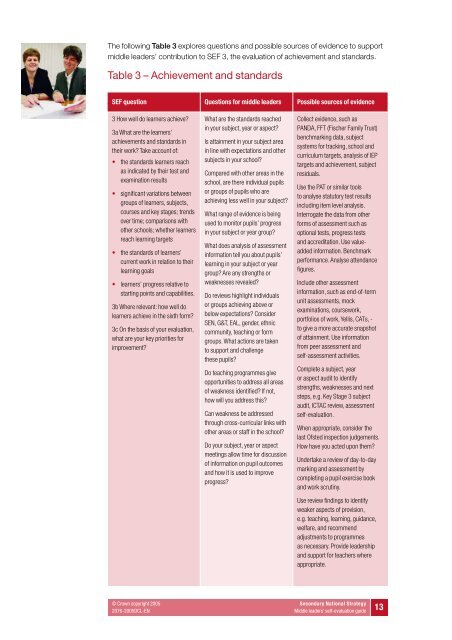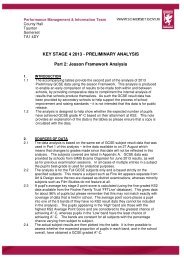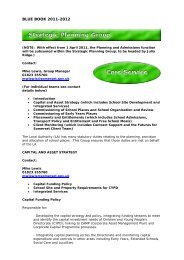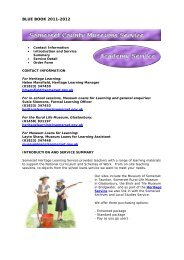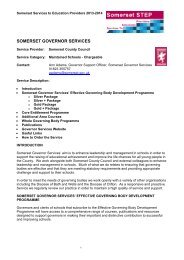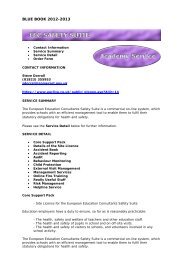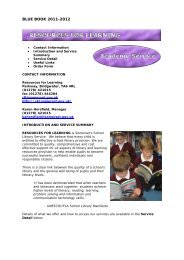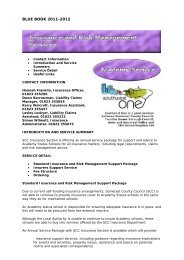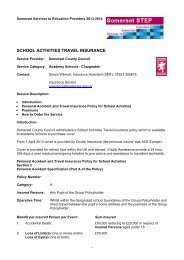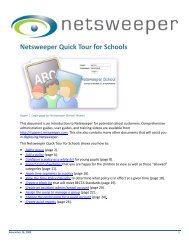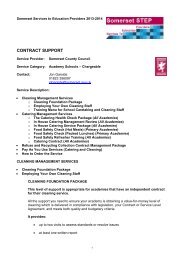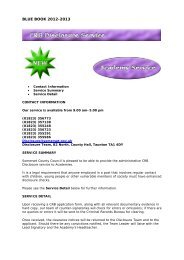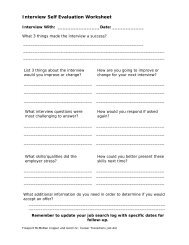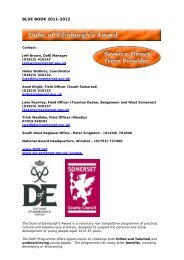Middle leaders' self-evaluation guide
Middle leaders' self-evaluation guide
Middle leaders' self-evaluation guide
Create successful ePaper yourself
Turn your PDF publications into a flip-book with our unique Google optimized e-Paper software.
The following Table 3 explores questions and possible sources of evidence to support<br />
middle leaders’ contribution to SEF 3, the <strong>evaluation</strong> of achievement and standards.<br />
Table 3 – Achievement and standards<br />
SEF question Questions for middle leaders Possible sources of evidence<br />
3 How well do learners achieve?<br />
3a What are the learners’<br />
achievements and standards in<br />
their work? Take account of:<br />
• the standards learners reach<br />
as indicated by their test and<br />
examination results<br />
• significant variations between<br />
groups of learners, subjects,<br />
courses and key stages; trends<br />
over time; comparisons with<br />
other schools; whether learners<br />
reach learning targets<br />
• the standards of learners’<br />
current work in relation to their<br />
learning goals<br />
• learners’ progress relative to<br />
starting points and capabilities.<br />
3b Where relevant: how well do<br />
learners achieve in the sixth form?<br />
3c On the basis of your <strong>evaluation</strong>,<br />
what are your key priorities for<br />
improvement?<br />
What are the standards reached<br />
in your subject, year or aspect?<br />
Is attainment in your subject area<br />
in line with expectations and other<br />
subjects in your school?<br />
Compared with other areas in the<br />
school, are there individual pupils<br />
or groups of pupils who are<br />
achieving less well in your subject?<br />
What range of evidence is being<br />
used to monitor pupils’ progress<br />
in your subject or year group?<br />
What does analysis of assessment<br />
information tell you about pupils’<br />
learning in your subject or year<br />
group? Are any strengths or<br />
weaknesses revealed?<br />
Do reviews highlight individuals<br />
or groups achieving above or<br />
below expectations? Consider<br />
SEN, G&T, EAL, gender, ethnic<br />
community, teaching or form<br />
groups.What actions are taken<br />
to support and challenge<br />
these pupils?<br />
Do teaching programmes give<br />
opportunities to address all areas<br />
of weakness identified? If not,<br />
how will you address this?<br />
Can weakness be addressed<br />
through cross-curricular links with<br />
other areas or staff in the school?<br />
Do your subject, year or aspect<br />
meetings allow time for discussion<br />
of information on pupil outcomes<br />
and how it is used to improve<br />
progress?<br />
Collect evidence, such as<br />
PANDA, FFT (Fischer Family Trust)<br />
benchmarking data, subject<br />
systems for tracking, school and<br />
curriculum targets, analysis of IEP<br />
targets and achievement, subject<br />
residuals.<br />
Use the PAT or similar tools<br />
to analyse statutory test results<br />
including item level analysis.<br />
Interrogate the data from other<br />
forms of assessment such as<br />
optional tests, progress tests<br />
and accreditation. Use valueadded<br />
information. Benchmark<br />
performance.Analyse attendance<br />
figures.<br />
Include other assessment<br />
information, such as end-of-term<br />
unit assessments, mock<br />
examinations, coursework,<br />
portfolios of work,Yellis, CATs, -<br />
to give a more accurate snapshot<br />
of attainment. Use information<br />
from peer assessment and<br />
<strong>self</strong>-assessment activities.<br />
Complete a subject, year<br />
or aspect audit to identify<br />
strengths, weaknesses and next<br />
steps, e.g. Key Stage 3 subject<br />
audit, ICTAC review, assessment<br />
<strong>self</strong>-<strong>evaluation</strong>.<br />
When appropriate, consider the<br />
last Ofsted inspection judgements.<br />
How have you acted upon them?<br />
Undertake a review of day-to-day<br />
marking and assessment by<br />
completing a pupil exercise book<br />
and work scrutiny.<br />
Use review findings to identify<br />
weaker aspects of provision,<br />
e.g. teaching, learning, guidance,<br />
welfare, and recommend<br />
adjustments to programmes<br />
as necessary. Provide leadership<br />
and support for teachers where<br />
appropriate.<br />
© Crown copyright 2005 Secondary National Strategy<br />
2076-2005DCL-EN <strong>Middle</strong> leaders’ <strong>self</strong>-<strong>evaluation</strong> <strong>guide</strong> 13


